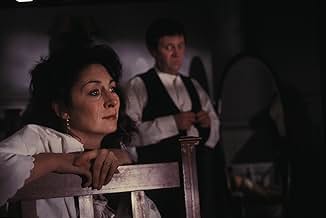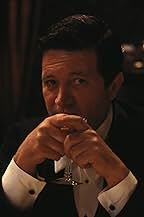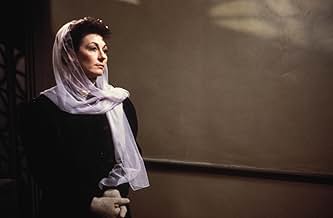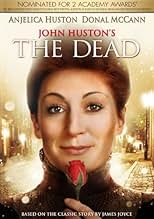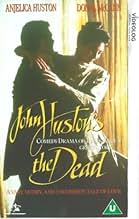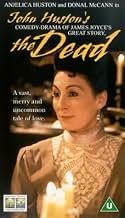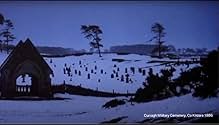Un soir de janvier, Gabriel Conroy et sa femme Greta se rendent à un diner entre amis chez ses tantes vieilles filles, une soirée qui sera une révélation pour tous les deux.Un soir de janvier, Gabriel Conroy et sa femme Greta se rendent à un diner entre amis chez ses tantes vieilles filles, une soirée qui sera une révélation pour tous les deux.Un soir de janvier, Gabriel Conroy et sa femme Greta se rendent à un diner entre amis chez ses tantes vieilles filles, une soirée qui sera une révélation pour tous les deux.
- Réalisation
- Scénario
- Casting principal
- Nommé pour 2 Oscars
- 10 victoires et 18 nominations au total
- Miss Furlong
- (as Katherine O'Toole)
- Mr. Grace
- (as Seán McClory)
Avis à la une
At dinner, tenor Frank Patterson sings for the guests, his lovely voice stealing through the walls like the scent of a garden into a tomb. Beauty like this makes us want to find someone, open our jugular vein, and urgently bleed into them. We feel that somewhere burns an unseen, silent, and impossibly distant Light. If only we could share that Light with someone, or at least share a quest for it. But how? Alas, we can only stand at the bedroom window alone, watching the snowfall like Anjelica Huston's husband (Donal McCann) does at the movie's end. Many characters in the movie spend their whole lives at that bedroom window. Others are like Michael Fury, dying in a freezing river as he stares at the house where his Beloved conducts her affairs, unresponsive to him. At one point, after a guest recites a moving poem, one of the female guests laments, "Imagine being loved like that." She means a devotion so intense as to rearrange our psyches. But her chance for love is gone, crushed beneath layers of dashed hopes now piled high like the snows of Ireland in the movie. No rose sprouts in these drifts; only long-buried yearnings that waft like a vapor around headstones.
This movie hints at secrets that are akin to something one experiences as a child who, lying awake and alone one night, spies a star outside the window and for an instant glimpses the Unspeakable. The child makes no mention of this to anyone - who would understand? ("That's nice, dear.") But the longing to share that glimpse with someone, or to share someone else's glimpse, burns until death. At the end of "The Dead," Anjelica Huston's husband realizes that he has shared no such glimpse with his wife, no such love. His wife has sobbed herself to sleep on the bed and remains silent as he looks out the bedroom window in the wee hours. Great stories have great dialogue, but the greatest have characters whose silence points to the realm of boundless could-be's. We hear the husband's lamenting thoughts as exterior night scenes melt into one another. Fields, starlit graveyards, wizened trees -- all hushed as "snow is gently falling all over Ireland, and falling gently."
No routine tale of collision between desire and proscription this; no melodramatic costume-struggle between attraction and social propriety. "The Dead" speaks to each person's Star of Bethlehem, glimpsed once and then repressed until something like this dinner party shakes it loose. On the morrow the guests will tell themselves that they simply had too much wine at the party, and will thereby seal Heaven into their mental cellar once more. Their pain will continue as always.
Sensitive and understated, I give this one top marks across the board. Bravo to John Huston. A fitting last effort by a great director.
University professor Gabriel Conroy (McCann) and his wife Gretta (Houston) are invited to attend the annual dance and dinner to celebrate the Feast of the Epiphany, hosted by the former's aunties, the Morkan sisters, Kate (Carroll) and her elder sibling Julia (Delany), as well as their niece Mary Jane (Craigie). Other guests are also presented, among which there is Mr. Grace (McClory, the Irish old stager in his final silver screen presence), a character doesn't exist in Royce's original text, entertains audience with his sublime recitation of a Middle Irish poem YOUNG DONAL, " ..You have taken the east from me; you have taken the west from me; you have taken what is before me and what is behind me; you have taken the moon, you have taken the sun from me; and my fear is great that you have taken God from me.", it is a magic moment where the sheer power of words embraces its deserved cinematic glory.
Another highlights include Freddy Malins (Donnelly, an unforeseen usurper in my BEST SUPPORTING ACTOR list), a middle-aged bachelor, a raging alcoholic, Gabriel's childhood friend, noticeably under the influence, his soused conduct sterlingly breathes an air of discomfiture and drollness on top of the cordiality presented by the rest of the ensemble; whereas his mother Ms. Malins (Kean), a helicopter parent who perhaps isn't even aware of what damage she has done, and risibly puzzles why her son keeps being such a disappointment and laughing stock.
Irish hospitality, as Gabriel addresses in his heart-felt tribute speech to the three hostesses, whom he praises as "three Graces", is the glue brings everybody altogether, regardless of their tastes in music, political stances or even religious persuasions. Cathleen Delany as Aunt Julia, upstages the rest of the Irish ensemble with her grand reaction shots and bolstered by her rendition of an Irish folk song, purely because it is too rare a case that the script would give sizable screen time to a senior lady singing in her weather-beaten timbre (apart from Ms. Florence Foster Jenkins for obvious reason).
Anjelica Houston, shares her last journey of movie-making with her esteemed father, takes a back seat in the dinner party with her composed demeanor, until Gretta's concealed memory is unexpectedly prompted by THE LASS OF AUGHRIM sung by the tenor Bartell D'Arcy (Patterson), when the party is winding down. In her quietly poignant confession of a deceased young man who she fell in love with, the film reaches its well-earned catharsis through Donal McCann's reflective voice-over about certain existential epiphany, enhanced by the picturesque montage from DP Fred Murphy and Alex North's conspicuously pensive accompanying score.
John Houston takes his exit with an elegiac meditation in honoring his forefathers and passing on his wisdom to his devout audience, it is brimming with loftiness, sincerity and an utterly captivating sensibility, and we wish the party would never be over, because goodbye is the hardest word to say to a beloved master.
To bring such a short story to the cinema was always going to be tricky. John Huston did a magnificent job. He never gave in to temptation to play it up or use fancy technique to expand on the story. It is simple and true, with outstanding acting. The only slight miss-step is the use of music to accompany the devastating final soliloquy.
Its rare indeed for a movie version of a literary masterpiece to be itself a masterpiece, but I think its fair to use this term for this movie. Its not a bravura piece of film making, but it is simple and pure - I always think of Ozu's movies when i think of The Dead, its at that level of purity and simplicity and deep wisdom.
Le saviez-vous
- AnecdotesThe character Mr. Grace does not appear in James Joyce's original story. He is an invention of John Huston and Tony Huston's, and was chiefly included so as to permit a reading of the eighth-century Irish poem Donal Og ("Young Donal"). Although it represents a departure from Joyce's text, the poem is nonetheless appropriate to the story's themes: like the song "The Lass of Aughrim" that follows it, "Donal Og" deals with the suffering that love can bring to young women...just as it has for Greta.
- GaffesMolly says she is off to a union meeting in Liberty Hall to hear James Connolly speak. The movie is set on January 6, 1904. However, James Connolly had emigrated to the USA in 1903, where he arrived on September 18, 1903. He did not return to Ireland before 1910. He arrived in Derry on July 26, 1910.
- Citations
[last lines]
Gabriel Conroy: [voice over] One by one, we're all becoming shades. Better to pass boldly into that other world, in the full glory of some passion, than fade and wither dismally with age. How long you locked away in your heart the image of your lover's eyes when he told you that he did not wish to live. I've never felt that way myself towards any woman, but I know that such a feeling must be love. Think of all those who ever were, back to the start of time. And me, transient as they, flickering out as well into their grey world. Like everything around me, this solid world itself which they reared and lived in, is dwindling and dissolving. Snow is falling. Falling in that lonely churchyard where Michael Furey lies buried. Falling faintly through the universe and faintly falling, like the descent of their last end, upon all the living, and the dead.
- Versions alternativesTen minutes of the film have been omitted from the 2009 DVD release.
- ConnexionsFeatured in John Huston and the Dubliners (1987)
Meilleurs choix
- How long is The Dead?Alimenté par Alexa
Détails
- Date de sortie
- Pays d’origine
- Langues
- Aussi connu sous le nom de
- Les gens de Dublin
- Lieux de tournage
- Sociétés de production
- Voir plus de crédits d'entreprise sur IMDbPro
Box-office
- Montant brut aux États-Unis et au Canada
- 4 370 078 $US
- Week-end de sortie aux États-Unis et au Canada
- 69 074 $US
- 20 déc. 1987
- Montant brut mondial
- 4 370 078 $US
Contribuer à cette page



